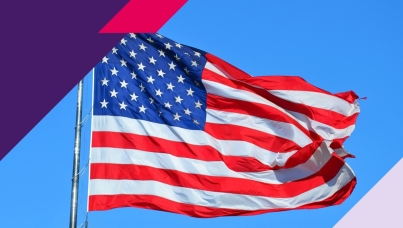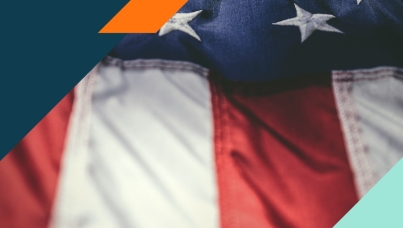

Latest U.S. opinion polls
Updated on January 20, 2026 at 10:15AM ET.
| December 2025 November 2025 October 2025 September 2025 |
| 2025 Archive |
January 2026:
Many Americans view ICE shooting in Minneapolis as excessive use of force
Washington DC, January 20, 2026 – By 52% to 25%, more Americans say the fatal shooting of Renee Nicole Good by a U.S. immigration officer was an excessive rather than a necessary use of force, according to a new Ipsos poll.
Plurality say U.S. does not have responsibility to support anti-government protesters in Iran
Washington DC, January 20, 2026 – Most Americans have heard at least a little about anti-government protests in Iran and the government’s subsequent crackdown, according to a new Ipsos poll.
January 2026 LSEG/Ipsos Primary Consumer Sentiment Index
Washington DC, January 16, 2025--The LSEG/Ipsos Primary Consumer Sentiment Index for January 2026 is at 53.8. Fielded from December 24, 2025 – January 5, 2026, the Index is up two points from last month.
Americans oppose using military force to take possession of Greenland
Washington DC, January 14, 2026 – Just 17% of Americans approve of U.S. efforts to acquire Greenland and the public overwhelming says the use of military force to take possession of Greenland would be a bad idea a rather than a good idea (71%-4%), according to a new Reuters/Ipsos poll.
Americans have mixed reaction to the U.S. removal of Venezuelan president
Washington DC, January 5, 2026 – Americans are split over U.S. military action in Venezuela to remove President Nicolas Maduro: 33% say they approve of the U.S. removing the Venezuelan president compared with 34% who disapprove and 32% who say they are not sure, according to a new Reuters/Ipsos poll fielded shortly after the U.S. capture of Maduro.
December 2025:
Nine trends that explain 2025
Washington, DC, December 19, 2025 – As 2025 winds down, Ipsos looks back on what was an eventful year. From the economy to artificial intelligence, here are the big trends that shaped the past year.
Reuters/Ipsos Poll
Washington, DC, December 17, 2025 – The cost of living remains the top issue for Americans when it comes to the 2026 congressional elections, according to a new Reuters/Ipsos poll. The areas of everyday expenses Americans most want members of Congress to focus on include healthcare, housing, and food costs. The poll also finds that while a majority of Americans disapprove of Trump’s handling of the cost of living, they are split between preferring the Democratic Party or the Republican Party to best handle the issue.
December Reuters/Ipsos Core Political
Washington, DC, December 17, 2025 – The December Reuters/Ipsos Core Political survey shows the economy continues to be seen as the most important problem facing the nation. Similar to last month, about two in five Americans approve of the job Donald Trump is doing as president.
December 2025 LSEG/Ipsos Primary Consumer Sentiment Index
Washington, DC, December 12, 2025 – The LSEG/Ipsos Primary Consumer Sentiment Index for December 2025 is at 51.9. Fielded from November 21 – 26, 2025, the Index is up 0.5 point from last month.
The index has increased slightly following last month’s decline. However, it sits nearly six points lower than its reading from this time last year.
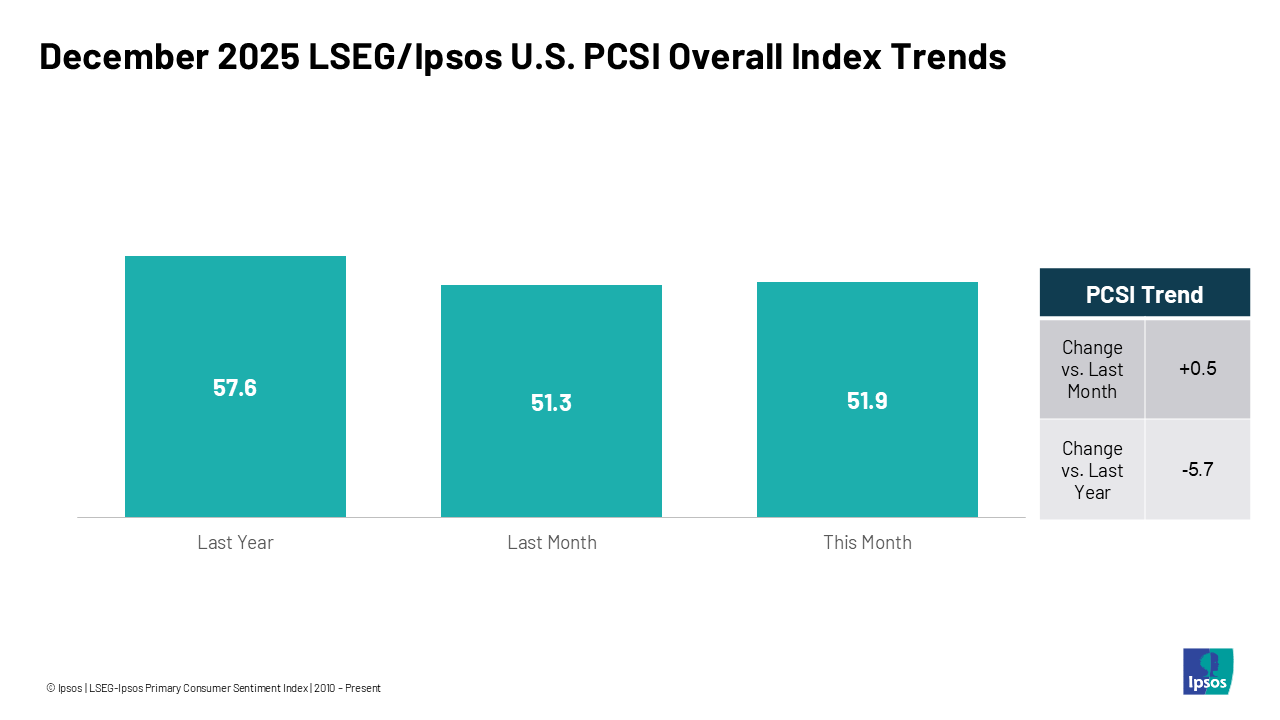
Ipsos Consumer Tracker
Washington, DC, December 12, 2025 – The latest wave of the Ipsos Consumer Tracker finds that many Americans plan to make resolutions for the new year. When it comes to finances, nearly four in five say they plan to save more money, and 68% aim to stick to a household budget. Strong majorities also plan to make health-related resolutions, such as drinking more water, exercising more, and eating healthier.
The poll also finds that, when it comes to holiday gifts, gift cards are the category they most wish to receive from friends and family, followed by clothing and apparel and food or beverages. At least one in five would prefer small electronics, jewelry, cosmetics and perfume, or travel or memberships. Notably, 16% say they do not expect to receive gifts this year.
Q4 2025 MetLife/U.S. Chamber of Commerce Small Business Index
Washington, DC, December 10, 2025 – The Q4 2025 MetLife/U.S. Chamber of Commerce Small Business Index is 68.4, down from last quarter’s Index score of 72.0. The current Index score is in line with sentiments from this time last year (69.1). Most measures this quarter do not show a significant decline. However, there is a slight softening across some key measures, including comfort with cash flow, the local economic environment, and future expectations, that have contributed to a lower index score. Notably, in a reversal from last quarter, fewer now report being very comfortable with their current cash flow.
For more information about this study, please click here.
U.S. Travel Association/Ipsos Poll
Washington, DC, December 9, 2025 – A new Ipsos poll conducted on behalf of the U.S. Travel Association finds that a majority of Americans are worried that the U.S. is falling behind globally when it comes to investing in technology used to keep airport security moving efficiently and securely. With the nation’s 250th birthday, the 2026 FIFA Men’s World Cup, and the 2028 Summer Olympics on the horizon, few Americans feel that the U.S. Air Travel system is prepared to accommodate the anticipated surge in travelers. At the same time, the poll reveals Americans believe it is important for the country to deliver a safe and efficient travel experience for these landmark events.
While Americans express concern about the current state of airport security infrastructure, the poll also reveals strong support for modernization efforts. According to the survey, Americans back security checkpoint updates that have already been implemented — such as allowing all passengers to keep their shoes on during screening — and the majority also support new policies under consideration, including leaving laptops in bags and permitting larger amounts of liquids through security. Lastly, few Americans are familiar with the 9/11 Passenger Security Fee, but once informed about it, the overwhelming majority agree that Congress should direct all of its funds toward investing in modern airport security technology.
For more information about this study, please click here.
NAMI/Ipsos Mental Health Poll
Washington, DC, December 3, 2025 – Americans remain largely supportive of federal funding for mental health services and suicide prevention programs, according to a new study from the National Alliance on Mental Illness (NAMI) and Ipsos. At the same time, nearly three in four U.S. adults oppose cutting federal jobs and programs focused on mental health services, opioid treatment, and suicide prevention programs, with half (49%) strongly opposing these cuts.
This NAMI/Ipsos poll also finds that most Americans believe Congress is doing too little to address mental health needs in the U.S., and nearly two in three believe the U.S. is spending too little on resources for mental health services. The survey, conducted on the probability-based KnowledgePanel, provides critical insights into how Americans view the U.S. mental health care system and support action from policymakers. For more on this study, click here.
November 2025:
Ipsos Sports Betting Poll
Washington, DC, November 21, 2025 – A new Ipsos poll finds that nearly half of Americans agree that sports betting lessens the integrity of the game, a significant increase from earlier this year. A similar percentage are also concerned that sporting events are rigged due to gambling. Consistent with these views, significantly more Americans support than oppose increased regulation of sports betting, either from individual sports leagues or the federal government.
The poll also finds that pluralities of Americans and sports fans support banning betting ads during games. Yet, despite these concerns, one in six Americans report placing a live bet on sports this year, a figure that has doubled since last year.
Ipsos Consumer Tracker
Washington, DC, November 21, 2025 – The latest wave of the Ipsos Consumer Tracker finds that 56% of Americans are spending only on daily necessities right now. Forty-six percent are pulling from savings to cover expenses, and 37% are putting more purchases on credit cards than usual. Notably, those ages 18-34 are more likely to report doing each of these than their age 55+ counterparts.
The poll also finds that, as the holiday season ramps up, three in four Americans have some concern about buying gifts online. The biggest worry is shipping taking too long (38%), followed by the potential hassle of returning an item (32%). Lastly, 30% are concerned that quality will be lower than expected, a ten percentage point increase from October 2021 (20%).
November Reuters/Ipsos Core Political
Washington, DC, November 19, 2025 – The November Reuters/Ipsos Core Political survey finds the economy is the most important problem facing the country, up six points from last month, and knocking political extremism out of the top concern. Three in five say the country is headed off on the wrong track, unchanged from last month. President Donald Trump’s approval rating has fallen to 38%, the lowest level of his second term.
November 2025 LSEG/Ipsos Primary Consumer Sentiment Index
Washington, DC, November 14, 2025 – The LSEG/Ipsos Primary Consumer Sentiment Index for November 2025 is at 51.3. Fielded from October 24 – 31, 2025, the Index is down 1.5 points from last month.
The index has declined more than a point for the second time in three months. It now sits more than four points lower than its reading from this time last year.
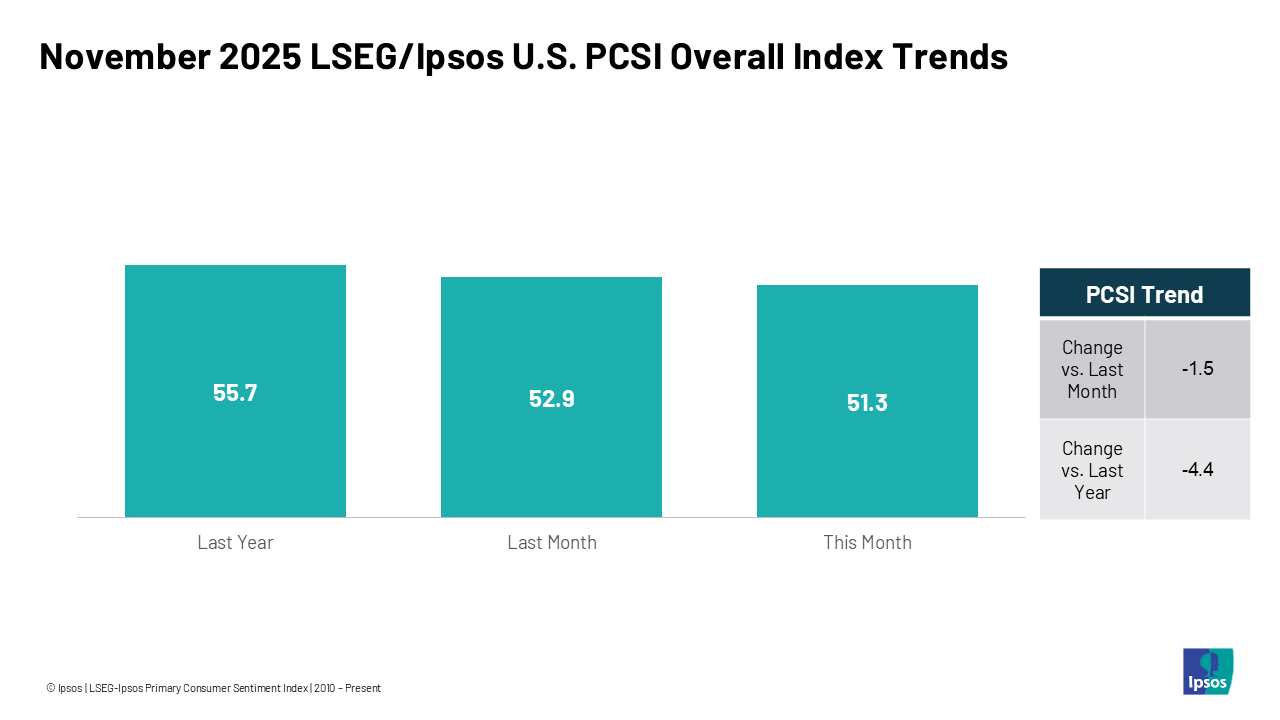
Thrivent Financial Poll
Washington, DC, November 11, 2025 – A new Ipsos poll conducted on behalf of Thrivent Financial explores how Americans plan to adapt their holiday spending due to the current economic climate.
As Americans approach the holiday season, their financial outlook is a mixed picture of cautious optimism and practical concerns. While three in five report feeling financially healthy heading into the holidays, roughly a third say they feel more pessimistic about their financial situation now compared to this time last year. Overall, half of all Americans express at least some concern about managing their holiday finances, with parents, women, and younger people expressing greater concern than their counterparts.
Ipsos Consumer Tracker
Washington, DC, November 7, 2025 – The latest wave of the Ipsos Consumer Tracker finds that 58% of Americans agree their community should approve more affordable housing construction, still a majority but down seven percentage points from January (65%). Along these lines, two in five (43%) say there are not enough homes on the market where they live, and 37% believe renting is more affordable than owning where they live. Notably, Americans under age 35 are more likely to hold these sentiments than those ages 55 and older.
The poll also finds that 56% of Americans who are familiar with artificial intelligence (AI) report using generative AI tools at least some of the time, an eleven-percentage point increase from March (45%). Among those who use generative AI products, the top reason for using them is searching for information (53%). Other common uses include comparing things (33%), brainstorming (30%), entertainment (25%) and getting personalized recommendations (23%).
Axios/Ipsos Latino Poll
Washington, DC, November 6, 2025 – Two in three Latinos feel it is a bad time to be Latino or Hispanic in America, according to a new Axios/Ipsos poll conducted in partnership with Noticias Telemundo. This represents a sharp increase in unease and uncertainty about their place in society over the last year. The poll, conducted among over 1,100 Latino/Hispanic Americans, also finds fewer Latinos feel like they can live the “American Dream” compared to the past few years. These shifts in opinion come as roughly one in three Latinos indicate they have changed how they go about their daily life due to recent immigration enforcement efforts and many express concerns about their own physical safety or that of a loved one.
NIL remains broadly popular, but some have worries about the future of college athletics
Washington, DC, November 5, 2025 – The landscape of college athletics has changed dramatically in recent years driven by the introduction of Name, Image, and Likeness (NIL) rights for athletes in 2021 and the rollout of athlete revenue sharing this year.
Amid these changes, new Ipsos data finds that Americans strongly support student-athletes getting paid. However, the seismic shifts in the landscape of college athletics over the past five years have not come without concerns. There’s a growing sense among Americans that college athletics today are just about making money and many fans worry about the loss of tradition and pageantry in college sports.
Here are five charts on the how Americans view the recent changes in college athletics.
ABC News/Washington Post/Ipsos Government Shutdown Poll
Washington, DC, November 3, 2025 – As the federal government shutdown continues, three in four Americans express concern over the shutdown, according to a new ABC News/Washington Post/Ipsos poll. Americans are also divided along party lines on who is more to blame for the government shutdown but blame President Donald Trump and Republicans in Congress slightly more than Democrats in Congress. Moreover, Americans feel that both major political parties are out of touch with the concerns of most people today.
October 2025:
October Reuters/Ipsos Core Political
Washington, DC, October 29, 2025 – The October Reuters/Ipsos Core Political shows that Americans remain split on what is the most important issue facing the country today. Political extremism is the top concern, followed by the economy and immigration. Perceptions of the direction of the country remain stable, but pessimistic. President Donald Trump’s approval rating holds steady, driven by strong support among Republicans.
Ipsos Consumer Tracker
Washington, DC, October 24, 2025 – The latest wave of the Ipsos Consumer Tracker finds that a strong majority of Americans view having multiple sources of income (86%) as a safe way to build wealth. Around four in five say the same of owning a home (81%) and saving in a high-interest bank account (77%). On the other hand, Americans are more likely to view sports and other betting (75%), cryptocurrency (66%), and starting a business (59%) as risky methods of building wealth.
The poll also finds that three in four Americans (76%) say they don’t have enough control over how companies use their data. Nearly three in five (58%) agree that they have a good understanding of how companies collect and use their data, up slightly from October 2024 (53%).
Axios/Ipsos American Health Index
Washington, DC, October 16, 2025 – Americans' trust in federal health agencies is declining, according to the latest Axios/Ipsos American Health Index. The public expresses lower levels of trust in health information from the Centers for Disease Control and Prevention, U.S. Food and Drug Administration, and U.S. Department of Health and Human Services, declines driven by falling trust among Democrats. In part, these changes reflect public uncertainty over whether guidance from federal health agencies primarily reflects views of the Trump administration or views of career scientists. More broadly, Americans continue to find the current health and wellness information landscape challenging: large shares say they find health information confusing – or commercially motivated – and large shares wish it was easier to follow health and food safety recommendations.
October 2025 LSEG/Ipsos Primary Consumer Sentiment Index
Washington, DC, October 10, 2025 – The LSEG/Ipsos Primary Consumer Sentiment Index for October 2025 is at 52.9. Fielded from September 19 – 25, 2025, the Index is up 0.5 point from last month.
The index has increased slightly following last month’s decline. However, it continues to sit nearly three points lower than its reading from this time last year.
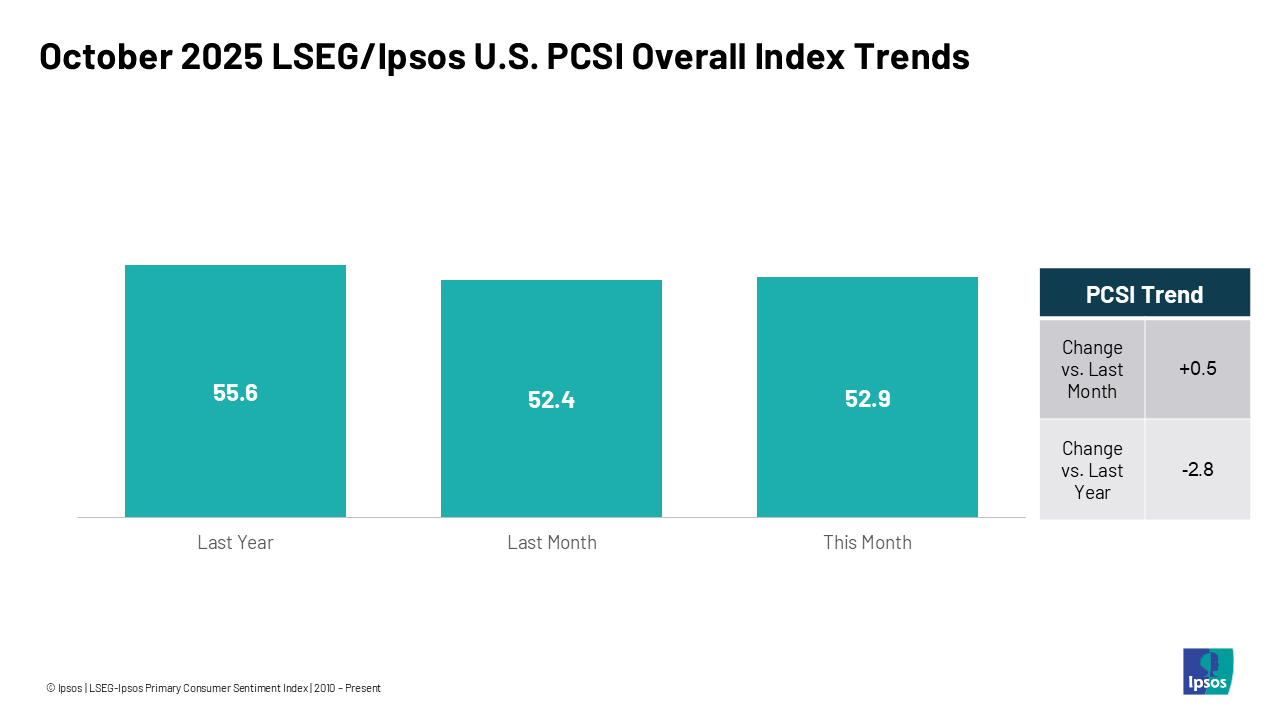
Ipsos Consumer Tracker
Washington, DC, October 10, 2025 – The latest wave of the Ipsos Consumer Tracker finds that 69% of Americans say they are spending more on food to cook at home and less on experiences like travel or dining out in the past six months. Notably, those ages 18-34 (76%) and 35-54 (75%) are more likely than their age 55+ counterparts (58%) to report doing this activity.
Looking ahead to the holiday season, about a third of Americans say they say they feel grateful (37%), happy (35%), or excited (32%). On the other hand, 28% report being stressed, and 19% say they are worried. Among those who feel stressed or worried, two in three (65%) cite paying for gifts as a source of concern.
Ipsos NIL Poll
Washington, DC, October 2, 2025 – A new Ipsos poll finds that Americans show strong support for paying college athletes and sharing athletic department revenues with them. The majority continue to agree that NIL has a positive impact on college athletics. At the same time, Americans also acknowledge the commercialized aspects of college athletics — a majority agree that the focus is now on making money, and some are concerned that the tradition and pageantry are being lost.
The poll also finds that pluralities of Americans report seeing more brand deals and endorsements for female athletes and express a desire to see more coverage of women’s sports. Lastly, around a third of Americans are interested in the 2026 World Cup and plan to watch, with younger generations showing more interest.
September 2025:
NPR/Ipsos Law Enforcement Poll
Washington, DC, September 27, 2025 – New NPR/Ipsos polling finds that nearly half of Americans believe that crime in the U.S. has increased in the last year, and a strong majority believe that the level of crime and violence in American cities is unacceptably high.
The poll also finds that a majority of Americans are familiar with recent debate over the deployment of National Guard troops to Americans cities, and that more Americans oppose than support the presence of the National Guard in Washington, D.C. and Memphis, TN.
Washington Post/Ipsos Political Poll
Washington, DC, September 26, 2025 – Americans trust the Republican Party over the Democratic Party to better handle issues like the economy, immigration and crime, according to a new Washington Post/Ipsos poll. And when it comes to the parties’ ideological positions, 54% describe the Democratic Party as “too liberal,” compared with a somewhat smaller share (49%) who describe the views of the Republican Party as “too conservative.”
Nonetheless, the survey finds that by a 53% to 42% margin, Americans would rather see the next Congress controlled by Democrats to “act as a check on Trump” rather than controlled by Republicans “to support Trump’s agenda.”
Ipsos Consumer Tracker
Washington, DC, September 26, 2025 – The latest wave of the Ipsos Consumer Tracker finds that 48% of Americans agree that after paying their bills, they do not have money left for the things they want. This is a seven-percentage point increase from May 2025 (41%). In the same vein, 45% now report that they worry about paying all of their bills each month, up five percentage points from May 2025 (40%) and ten percentage points from April 2024 (35%).
The poll also finds that 83% of Americans agree that homeownership is an important part of the American dream, up seven percentage points from December 2024 (76%). Along these lines, 62% agree that the government should have an active role in keeping mortgage rates low.
September Reuters/Ipsos Core Political
Washington, DC, September 24, 2025 – The September Reuters/Ipsos Core Political Survey shows that Americans view political extremism and threats to democracy as the most important issue facing the nation, following by the economy and corruption. President Trump’s approval rating remains stable, but his disapproval rating is increasing. Most Americans believe the country is headed off on the wrong track.
Q3 2025 MetLife/U.S. Chamber of Commerce Small Business Index
Washington, DC, September 23, 2025 – The Q3 2025 MetLife/U.S. Chamber of Commerce Small Business Index is 72.0, up from last quarter’s Index score of 65.2. The current Index score is in line with sentiments from this time last year (71.2). Small businesses are more optimistic about their view of the U.S. economy and their local economies compared to the previous quarter. There is also a slight increase in the number of owners and decision makers that expect to increase revenue in the next year. Notably, more now report being very comfortable with their current cash flow compared to earlier this year. Outlooks around other business expectations and business operations are more stable.
For more information about this study, please click here.
College Board/U.S. Chamber of Commerce 2025 New Hire Readiness Report
Washington, DC, September 19, 2025 – This survey from College Board and the U.S. Chamber of Commerce, conducted by Ipsos, looked at the readiness of new hires to enter the workforce. It sheds light on hiring managers' perceptions of preparedness of entry-level employees across a range of small, mid-sized, and large companies.
The survey results indicate that while the perceived quality and preparedness of entry-level employees is good, there is room for improvement in both areas. Notably, most also agree that most high school students are not prepared to enter the workforce when they graduate. Also, these hiring managers indicate that they do value industry-recognized credentials, but also highly value “soft skills” such as critical thinking and communication.
To read the full report, please click here.
DeFi Education Foundation
Washington, DC, September 18, 2025 – A new national study from DeFi Education Foundation (DEF), conducted by Ipsos, provides new insights into how Americans, especially in underbanked communities, view the existing U.S. financial system and emerging technologies, like crypto and decentralized finance. The poll, which was conducted on the Ipsos KnowledgePanel and supplemented by in-depth interviews in the Bronx and Queens, New York, show that Americans are frustrated with financial institutions, want greater control over their financial assets and data, and believe that innovations can support affordability, equity, and consumer protection in finance.
Reuters/Ipsos Political Violence Poll
Washington, DC, September 15, 2025 – An overwhelming share of Americans (90%) say there’s an urgent need for greater unity among Americans, according to a new Reuters/Ipsos survey conducted shortly after the killing of political activist Charlie Kirk. Calls for greater unity span political groups and come at a time when many feel the country is nearing a breaking point in its political divisions.
Americans continue to widely reject violent acts and threats in pursuit of political goals. Overall, 92% disagree that it’s acceptable to use violence to achieve a political goal, including more than nine-in-ten Republicans, Democrats, and independents. The country’s political discourse is seen as one contributor to political violence: 94% of U.S. adults say the way people talk about political issues in the country today encourages acts of violence among Americans.
September 2025 LSEG/Ipsos Primary Consumer Sentiment Index
Washington, DC, September 12, 2025 – The LSEG/Ipsos Primary Consumer Sentiment Index for September 2025 is at 52.4. Fielded from August 22 – September 2, 2025, the Index is down 1.1 points from last month.
The index has declined following stability the past two months. It now sits nearly three points lower than its reading from this time last year.
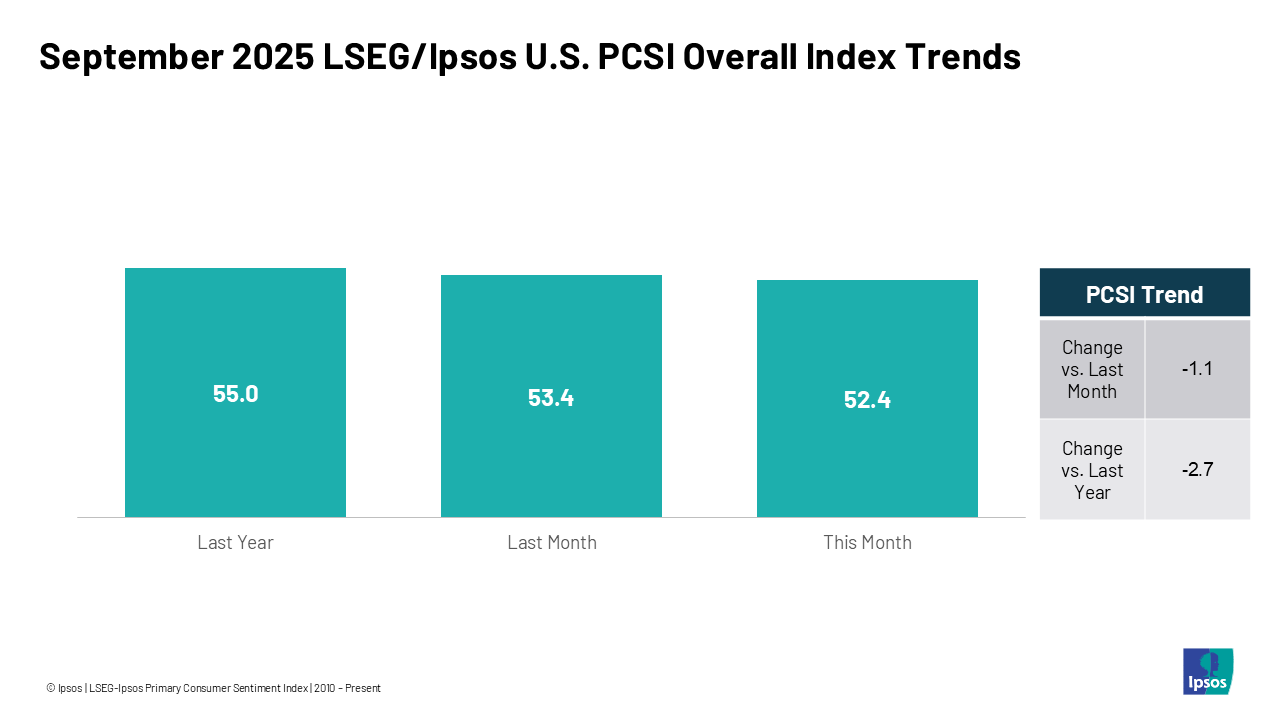
Ipsos Consumer Tracker
Washington, DC, September 12, 2025 – The latest wave of the Ipsos Consumer Tracker finds that 58% of Americans who are familiar with artificial intelligence (AI) have used an AI assisted search program in the past month. Nearly half have used an AI chat program (49%), and 39% have used an AI image generation system.
The poll also finds that 13% of Americans have already started their holiday shopping for the year. A majority report planning to do their shopping in either October (21%) or November (33%).

